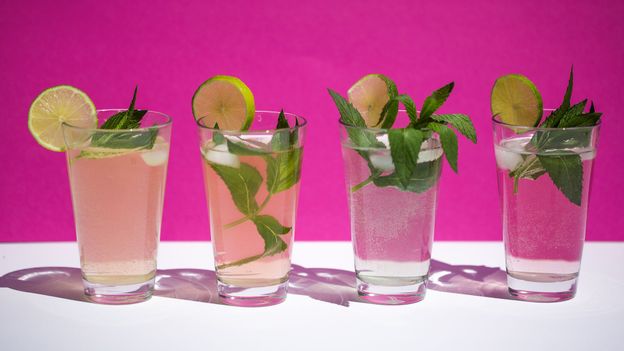Why alcohol affects women more than men

Features correspondent
 Getty Images
Getty ImagesMore and more women are addicted to booze – but their needs have largely been ignored by the medical establishment.
It used to be that men were the outsized alcohol drinkers in Western society – perhaps best depicted in popular culture by Don Draper’s Mad Men cronies, who swilled from office stashes of brown liquor, knocked back three-martini lunches and imbibed Old Fashioneds in an after-work pub culture where few women dared tread.
But the problem isn’t just that women are drinking more. Researchers are finding that women’s bodies are affected differently by alcohol than men’s bodies – for reasons that go beyond mere size.
 Getty Images
Getty ImagesMeanwhile, fat retains alcohol, while water helps disperse it. So thanks to their naturally higher levels of body fat and lower levels of body water, women experience an even more dramatic physiological response to alcohol.
“That vulnerability is why we see increases in medical problems in women with alcohol-use disorders, compared to men,” says Dawn Sugarman, a psychology professor at Harvard Medical School and addiction psychologist at McLean Hospital in Belmont, Massachusetts. (Find out more about how different bodies react to alcohol differently in our recent story Why do only some people get blackout drunk?)
 Getty Images
Getty ImagesMany of these gender-based differences in alcohol’s effects on the body weren’t discovered until recent decades. The earliest study on gender-based differences in ADH, for example, was published in 1990.
In fact, almost all clinical studies on alcohol were done entirely on men until the 1990s. This was partly because scientists were encouraged to eliminate as many variables as possible that might influence an experiment’s results – one of which was gender. And because alcoholism was assumed to be a mostly male problem, no-one wondered what not studying women and alcoholism might miss.
“People just didn’t think about women,” says Sharon Wilsnack, a psychiatry and behavioural science professor at the University of North Dakota’s School of Medicine and Health Sciences. “To the extent that they did, they just assumed, well, you could study men and it could apply to women.”
 Getty Images
Getty ImagesFor her PhD at Harvard University in the early 1970s, Wilsnack wrote her graduate dissertation about women and alcohol; her literature review then yielded only seven studies at Harvard’s Widener Library. With her husband, a sociologist, Wilsnack went on to lead the first long-term national study on women’s drinking habits. Among their many findings was the discovery that women who abuse alcohol often have been sexually abused as children, a gender difference that has since been deemed as crucial in helping women with addiction.
Gender-based alcohol research since then has turned up a variety of other sex-specific results.
When her team looked at the brains of long-term drinkers, they noticed that alcoholic men had smaller ‘reward centres’ than their male counterparts. This area of the brain, made up of parts of the limbic system and frontal cortex is tied to motivation; it is key for making decisions and even for basic survival. But in alcoholic women, the reward centers were larger than in the non-alcoholic women – implying that their brains were less damaged than their male counterparts.
“That blew us out of the water,” Oscar-Berman says. “Our findings are somewhat counter to the general idea that women have been more susceptible to alcohol damage in the brain than men.” Scientists don’t yet understand what might be causing these differences.
 Getty Images
Getty Images“Some women had been in [alcohol] treatment five, six, 10 times before, and were saying things like, ‘This is information I never heard before,’ and ‘I never heard that I’m more susceptible to alcohol than men, or that these substances affect me differently,’” says Sugarman.
Because of these differing motivations for drinking, their biological vulnerabilities and especially because of the link between women’s alcoholism and histories of trauma, it’s worth exploring how women’s alcohol treatment needs may be different from men’s. For example, women who have survived sexual assault may not feel safe entering the standard therapy group for alcohol treatment, where the gender breakdown can skew up to 70% male. For these women, hearing the stories of other women and knowing that they’re not alone has shown to be beneficial to their recovery.
Above all, say experts, the days of assuming that the research on men and alcohol can simply be applied to women should be long gone.
This story is part of the Health Gap, a special series about how men and women experience the medical system – and their own health – in starkly different ways.
Do you have an experience to share? Or are you just interested in sharing information about women’s health and wellbeing? Join our Facebook group Future Woman and be a part of the conversation about the day-to-day issues that affect women’s lives.




